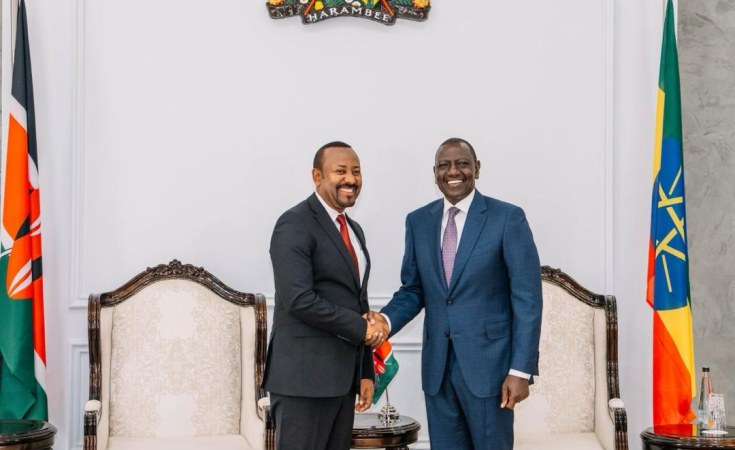Kenya and Ethiopia have reaffirmed their commitment to preserving the sovereignty and territorial integrity of states amid ongoing regional tensions, notably the dispute between Addis Ababa and neighbouring Somalia over a 50-year port access agreement with Somaliland.
The pledge came on Wednesday following extensive bilateral talks between President William Ruto and Ethiopia’s Prime Minister Abiy Ahmed at State House in Nairobi.
In a joint communique signed by Prime Cabinet Secretary Musalia Mudavadi and Ethiopian counterpart Taye Selasie, both Nairobi and Addis Ababa emphasized their rejection of coups and external interference in domestic political processes of African countries.
“They [Ruto and PM Abiy] affirmed their commitment to recognize, respect, and uphold the sovereignty and territorial integrity of states and to reject unconstitutional changes of government as well as interference in domestic political processes of African Countries by external interests,” the communique stated.
Addressing the security situation in the Horn of Africa, President Ruto and PM Abiy emphasized the paramount importance of maintaining peace, security, and stability within the continent, citing these as essential prerequisites for economic growth and development.
Moreover, the leaders highlighted the necessity of sustaining consultations to foster partnerships in the multilateral arena, aimed at accelerating reforms within the United Nations and other multilateral organizations.
Regular consultations, they argued, are crucial in making these bodies more representative, democratic, accountable, effective, and responsive to the current realities, threats, challenges, and opportunities.
The commitment comes against the backdrop of escalating tensions between Mogadishu and Addis Ababa since January, triggered by Somaliland’s signing of a Memorandum of Understanding with Ethiopia granting access to the Red Sea via Somaliland’s Berbera port for 50 years.
The agreement, inked between Abiy and Somaliland President Muse Bihi Abdi, allows Ethiopia to establish a naval base and utilize Somaliland’s coastline for military and commercial purposes, in exchange for formal recognition of Somaliland’s independence, declared in 1991.
Ethiopia’s decision to recognize Somaliland formally marked a historic milestone, with Addis Ababa also pledging a share of the state-owned Ethiopian Airlines to Hargeisa.
However, Somalia, asserting Somaliland as part of its territory, denounced the deal as “illegitimate” and “an act of aggression,” citing violations of sovereignty. Mogadishu recalled its ambassador to Addis in protest and on January 6, President Hassan Sheikh Mohamud nullified the agreement, citing legislative action to safeguard Somalia’s unity, sovereignty, and territorial integrity.


